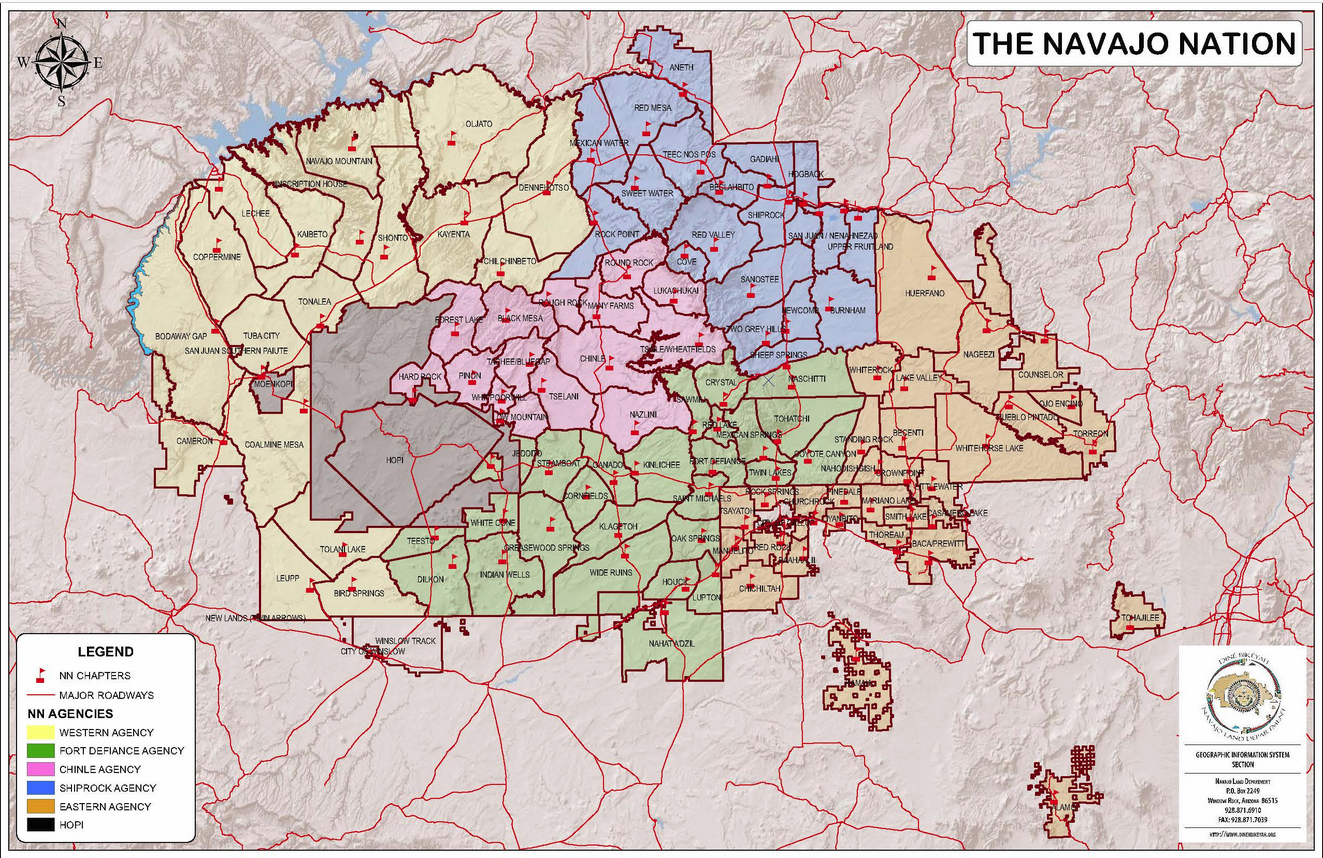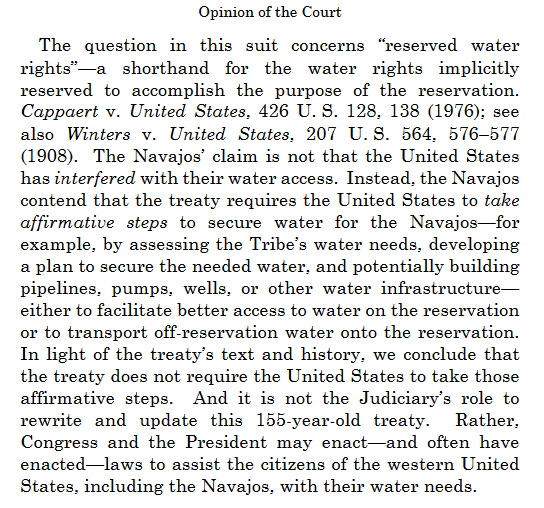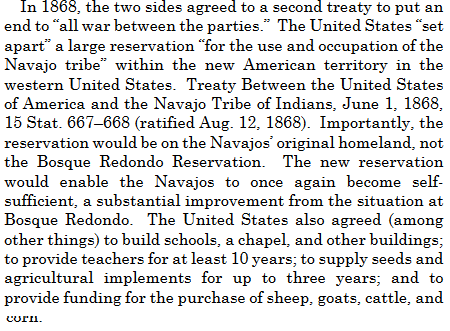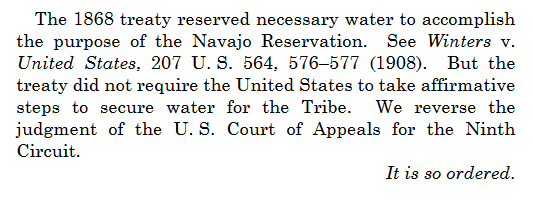On June 22nd the Supreme Court of the United States sometimes abbreviated SCOTUS decided 5 to 4 that the 1968 Treaty with the Navajo Tribe called for the U.S. to provide the land and funding for sheep, goats, cattle, and corn as well as education and some infrastructure but did not mention water. The decision of the Supreme Court was that if it did not mention water when written and agreed to, one can not just add “water” to the treaty now. The U.S. Supreme Court may not always be correct but they are last so this is likely the final legal decision on this but Congress and the Executive Branch of Government have not yet been heard from.
But then there is this part of the Court decision:
In addition, the Navajos may be able to assert the interests they claim in water rights litigation, including by seeking to intervene in cases that affect their claimed interests, and courts will then assess the Navajos’ claims and motions as appropriate. See 28 U. S. C. §1362; Arizona v. California, 460 U. S. 605, 615 (1983); see also Blatchford v. Native Village of Noatak, 501 U. S. 775, 784 (1991); Moe v. Confederated Salish and Kootenai Tribes of Flathead Reservation, 425 U. S. 463, 472–474 (1976).
So this case is over but the issue is not.

| The Hopi are a different tribe than the Navajo. For more information about the Navajo Nation click HERE. BTW yá’át’ééh means hello or welcome. If you live in New Mexico you tend to learn a little Navajo and we raise Navajo Churro Sheep so we are involved with the Navajo. HERE is the official statement by the Navajo Nation on yesterday’s Supreme Court Decision. |
This [ Source] is from the SCOTUS Blog when the Supreme Court accepted this case.

| Here is a link to the 1868 Treaty. Does it require the Federal Government to take action to supply water to the Navajo? Five Justices thought it did not and four Justices thought it did. |
From the June 22 SCOTUS Decision

and

| I am not going to review the entire Supreme Court decision. You can read the so-called “slip opinion” HERE [the final opinion will take a while to be edited and issued] if you are interested and the concurring and dissenting opinions add depth to our understanding of what some of the individual Justices thought. Basically our conservative Supreme Court by a 5-4 Decision decided that if something is not specified in a Treaty it is not there. Congress can pass legislation instructing the Executive Branch to help the Navajo find the water. Some believe the Federal Government has abused the concept of Reserved Water Rights. These were partially established in what is called the Rivers Doctrine named after a person. You can learn more about it HERE. HERE is the actual Court decision in the Winters case. I am not sure why Winters did not apply in the Navajo case. But I am just a journalist.
The idea that water might be scarce was not considered at that time when many decisions about water were made. With population growth and Global Warming, it is now a very different situation. |
How did the Court deal with Winters in this case?

| That was easy. |
There are many good resources for information on the work of the U.S. Supreme Court. The Court’s website is good and what is called SCOTUS Blog is good. Here is the record of this case that I found on SCOTUS Blog
–
| This is a very important decision. I hope you have found this article interesting and useful. Comments are invited. |
–
Treaties are agreements between sovereigns usually to settle disputes and form alliances. They are agreements at a time and place and under extant conditions. Treaties respect the rights and property of antecedent sovereigns unless changed by the succeeding signatory power by statute ordinance or regulation. Under the Spanish sovereign sedentary and well governed Native Americans were recognized with land grants whose boundaries were inviolably respected and still are by the U.S. Government. The Navajo, and Apache people were marauding Plains Indians. The Histories of the Bureau of Ethnology are ripe with stories of Navajos killing Acoma people, for example, and it was there tribes that were confined to reservation where they could be managed in the name of Peace and where the U.S. Government waged a battle against their culture by forcing their children into Indian boarding schools in an effort to turn them into White Men. Some reservation land was subdivided into Allotments to families to turn the Indian into a farmers when they are not farmers. To turn them into shepherds when they are not shepherds. This became a repudiated effort and Concentration Camp Native Americans began to use the White Man’s Law to gain their human rights, as well they should. These policies were applied to reservation Indians and the policies spilled over to to well-governed Pueblo Indians. Pueblo people were enslaved by the Spanish under the encomienda land grants. Acoma Children were shipped off to Indian schools in Albuquerque and Santa Fe where the American authorities worked hard to prevent them from using the language of their mothers. Having perpetrated these agricultural and inhuman upon the Indian People it is right and just that the American Government having practiced in parens patriae policies should provide the water necessary for them to survive on the reservations. The regulations are arguably the worst lands in America for survival. All was not to the absolute detriment of Native Americans because, as it turned out, great deposits of oil and gas were found below reservation and allotted lands such today, the BIA office in Albuquerque distributes hundreds of millions of dollars in royalty checks to Native Americans nation wide whose forefathers were the original allotees. In North Dakota O&G leases must be obtained from the heirs of the original allottees. The Three Nations (Hidatsa, Arikara, Mandan) also receive royalty income. With income from coal, mineral, oil & Gas and gambling the Native American’s are gradually buying back America with the White Man’s Dollar. This is taking place while you sleep folks, and rightly so. My firm broker’s water rights and I work for both sides to a transaction. I am happy to sell water rights, paid for by the government, to the government for Native American tribes.
So the email is a required field that you are not going to publish. More control by Big Brother.
Huh? Your comment was published. I did get an email alert on it today. Not sure why. If there was a delay in posting your comment I am sorry but I did not know there was a comment. I may have missed it. I usually get an email to approve but now it seems they get approved automatically but I could reject comments if they were inappropriate. Probably one of my Editors noticed that there was an unapproved comment and approved it. That is my best guess. I will take a look but CenturyLink has a habit of sending my email to my spam file.
I appreciate your comment and wonder what you think the impact of the Arizona decision will be on the Navajo Water Rights Adjudication here in New Mexico. It is a different situation than the one in Arizona.
WordPress will notify the author of a comment when there are later comments on the same article.
Also, if you are logged in to WordPress, no email address is requested because you are identified as a real person known to WordPress. I think the email request is to control Bots and other entities that add spam.
Here is some information from WordPress:
https://wordpress.com/forums/topic/email-address-is-sent-to-post-author-when-i-comment/
The informnation at this link explains why Sig did not receive a notification that your comment had been submitted.